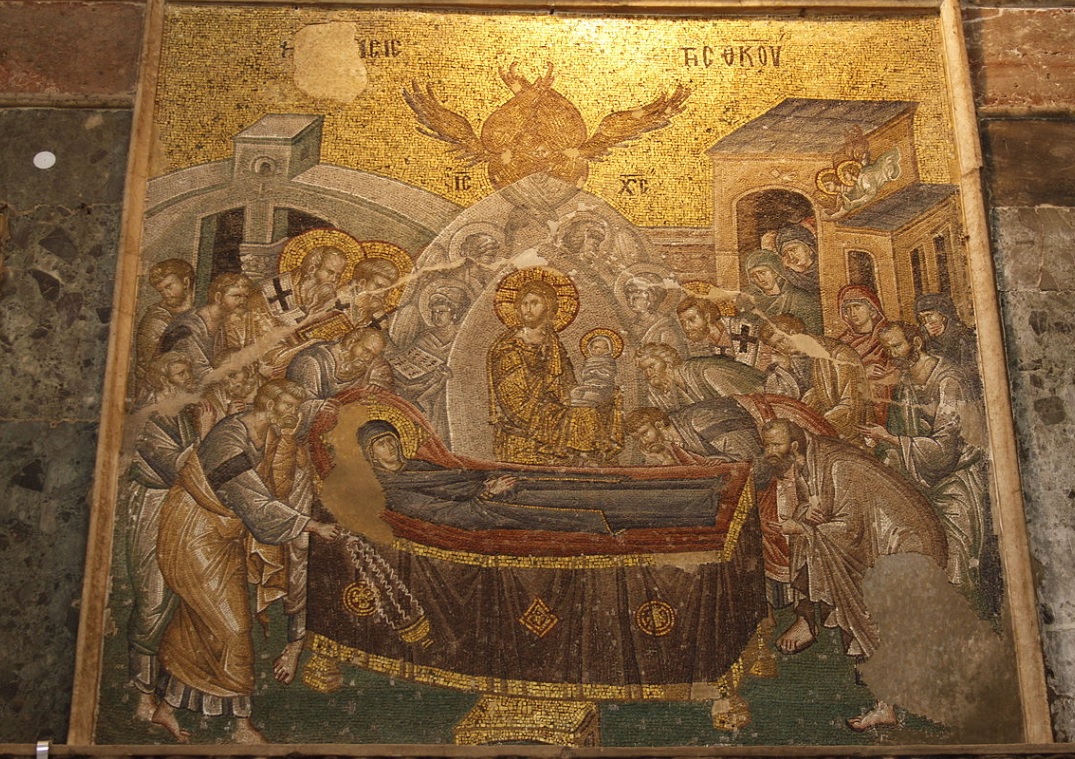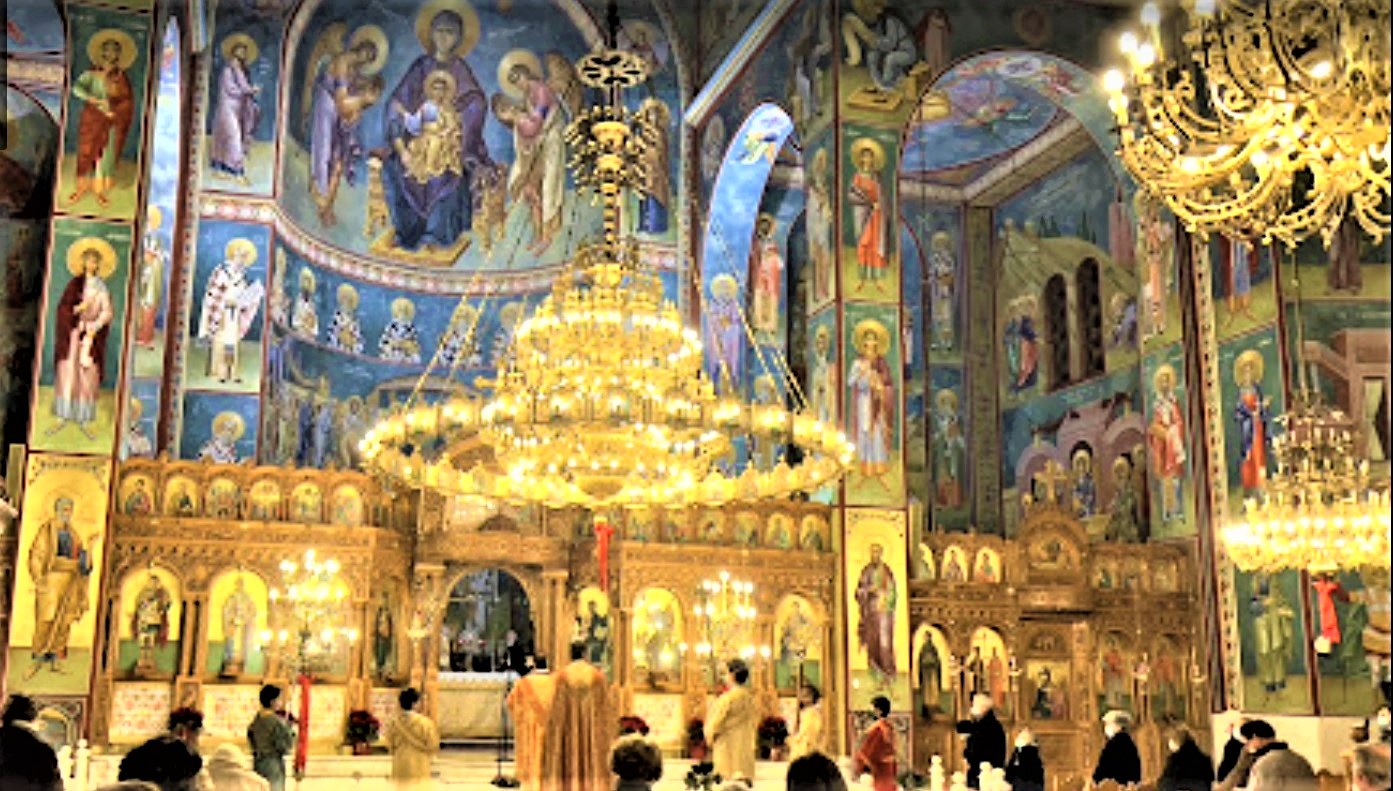According to Wikepedia:
“Entering heaven alive (called by various religions “ascension”, “assumption”, or “translation”) is a belief held in various religions. Since death is the normal end to an individual’s life on Earth and the beginning of afterlife, entering heaven without dying first is considered exceptional and usually a sign of a deity’s special recognition of the individual’s piety.
Church of Holy Assumption, Thessaloniki GREECE
Some Catholics believe that Mary died before being assumed, but they believe that she was miraculously resurrected before being assumed (mortalistic interpretation). Others believe she was assumed bodily into Heaven without first dying (immortalistic interpretation). Either understanding may be legitimately held by Catholics, with Eastern Catholics observing the Feast as the Dormition. It seems, however, that there is much more evidence for the mortalistic position in the Catholic traditions (liturgy, apocrypha, material culture). It is also worth noting that St. Pope John Paul II expressed the mortalistic position in his public speech.
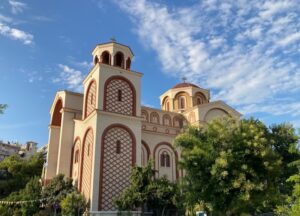
Church of Holy Assumption, Thessaloniki
Many theologians note by way of comparison that in the Catholic Church the Assumption is dogmatically defined, whilst in the Eastern Orthodox tradition the Dormition is less dogmatically than liturgically and mystically defined. Such differences spring from a larger pattern in the two traditions, wherein Catholic teachings are often dogmatically and authoritatively defined – in part because of the more centralized structure of the Catholic Church – whilst in Eastern Orthodoxy many doctrines are less authoritative.
The Catholic Feast of the Assumption is celebrated on 15 August and the Eastern Orthodox and Eastern Catholics celebrate the Dormition of the Mother of God (the falling asleep of the Mother of God) on the same date, preceded by a 14-day fast period. Eastern Christians believe that Mary died a natural death, that her soul was received by Christ upon death, that her body was resurrected after her death and that she was taken up into heaven bodily in anticipation of the general resurrection.
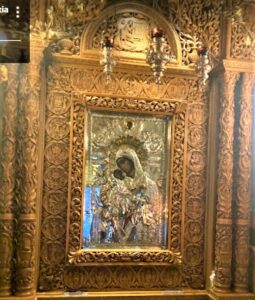
Church of Panagia Dexia, Thessoloniki.
Orthodox tradition is clear and unwavering in regard to the central point [of the Dormition]: the Holy Virgin underwent, as did her Son, a physical death, but her body – like His – was afterwards raised from the dead and she was taken up into heaven, in her body as well as in her soul. She has passed beyond death and judgement and lives wholly in the Age to Come. The Resurrection of the Body … has in her case been anticipated and is already an accomplished fact. That does not mean, however, that she is dissociated from the rest of humanity and placed in a wholly different category: for we all hope to share one day in that same glory of the Resurrection of the Body that she enjoys even now.” ~Wikipedia
On November 1, 1950, the dogma of the Assumption of the Divine Mother, Blessed Virgin Mary was proclaimed.
Pope Pius XII, proclaimed in the Constitution “Munificentissimus Deus”:
“After we have poured forth prayers of supplication again and again to God, and have invoked the light of the Spirit of Truth, for the glory of Almighty God who has lavished his special affection upon the Virgin Mary, for the honor of her Son, the immortal King of the Ages and the Victor over sin and death, for the increase of the glory of that same august Mother, and for the joy and exultation of the entire Church; by the authority of our Lord Jesus Christ, of the Blessed Apostles Peter and Paul, and by our own authority, we pronounce, declare, and define it to be a divinely revealed dogma: that the Immaculate Mother of God, the ever
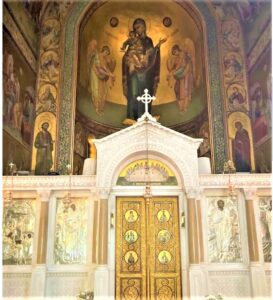
Church of Panagia Dexia, Thessoloniki
Virgin Mary, having completed the course of her earthly life, was assumed body and soul into heavenly glory. “
Pope Pius XII presented several fundamental reasons for the definition of this dogma:
“1-The immunity of Mary from all sin: the decomposition of the body is a consequence of sin, and since Mary was free from all sin, she was exempt from the universal law of corruption, being able then to enter promptly, in body and soul, into the glory of heaven.
2-Her Divine Maternity: since Christ’s body was formed in the body of Mary; it was fitting that the body of Mary would participate of the same privilege of the Body of Christ. She conceived Jesus, gave birth to Him, nourished Him, cared for Him, laid Him on her chest. We cannot imagine that Jesus would allow the body that gave Him life to corrupt.
3-Her Perpetual Virginity: since her body was preserved in virginal integrity, (all for Jesus and being a living tabernacle) it was fitting that after her death she would not suffer corruption.
4-Her participation in the redemptive work of Christ: Mary, Mother of the Redeemer, by her intimate participation in the redeeming work of her Son, after the consummation of her earthly life, received the full fruit of redemption, which is the glorification of body and soul.
The Assumption is the victory of God confirmed in Mary and assured for us, the Assumption is a sign and promise of the glory that awaits us when at the end of the world our bodies resurrect and are reunited with our souls.”
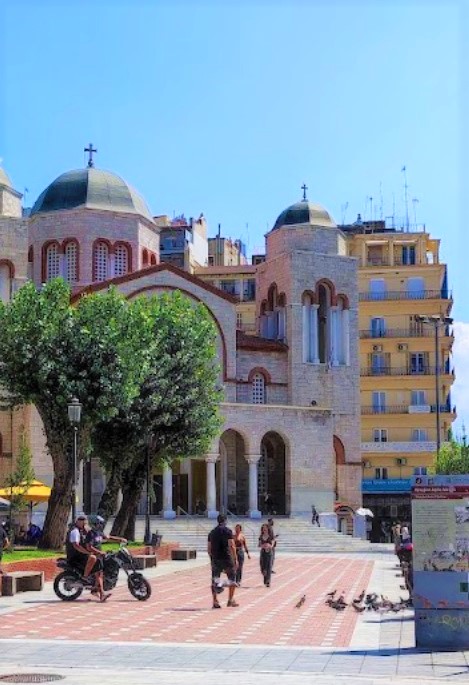
Church of Panagia Dexia, Thessoloniki
According to The Apostolic Constitution of Pope Pius XII on the Assumption of the Blessed Virgin Mary, the Liturgy of the Hours from August 15 (AAS 42 [19501, 760-762. 767-769)
” In their homilies and sermons on this feast the holy fathers and great doctors spoke of the assumption of the Mother of God as something already familiar and accepted by the faithful. They gave it greater clarity in their preaching and used more profound arguments in setting out its nature and meaning. Above all, they brought out more clearly the fact that what is commemorated in this feast is not simply the total absence of corruption from the dead body of the Blessed Virgin Mary but also her triumph over death and her glorification in heaven, after the pattern set by her only Son, Jesus Christ.”
and
“Saint Germanus of Constantinople considered that it was in keeping not only with her divine motherhood but also with the unique sanctity of her virginal body that it was incorrupt and carried up to heaven: “In the words of Scripture, you appear in beauty. Your virginal body is entirely holy, entirely chaste, entirely the house of God, so that for this reason also it is henceforth a stranger to decay: a body changed, because a human body, to a preeminent life of incorruptibility, but still a living body, excelling in splendor, a body inviolate and sharing in the perfection of life.”
“Body is Incorruptible, Still Living and Excelling in Splendor”
